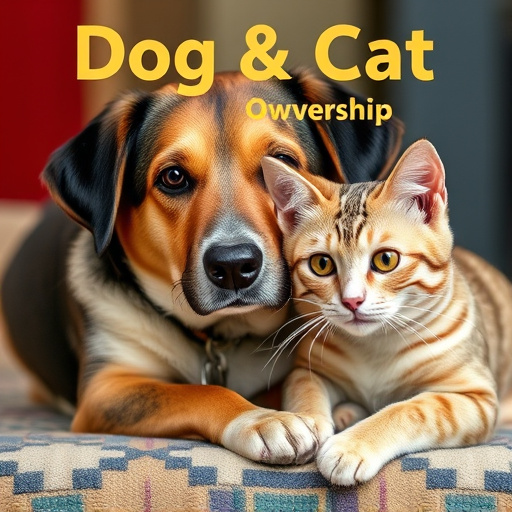
Dog and cat ownership strengthens human-animal bonds, offering profound emotional support and physiological benefits. Interacting with these pets releases oxytocin, reducing stress, anxiety, and depression while lowering blood pressure. Regular physical activity from walking dogs further enhances mental well-being and cardiovascular health. Research confirms that dog and cat ownership significantly contributes to lower hypertension rates due to the calming presence and increased oxytocin levels they foster.
“Unleash the power of furry friends! Discover the science behind the profound impact of dog and cat ownership on cardiovascular health, particularly in reducing blood pressure. This article explores the compelling connection between man’s best friend and our well-being. From bonding to stress reduction, we delve into the mechanisms that make pet ownership a game-changer for heart health. Join us as we navigate the vibrant tapestry of research, highlighting case studies and findings that underscore the positive effects of these beloved pets on our lives.”
- Dog & Cat Ownership: An Overview of Pet-Human Bonding
- The Impact of Pets on Stress and Anxiety Reduction
- Physiological Benefits: Lower Blood Pressure and Pets
- Mechanisms Behind Pets' Positive Effect on Cardiovascular Health
- Case Studies and Research Findings on Pet Ownership and Blood Pressure
Dog & Cat Ownership: An Overview of Pet-Human Bonding

Dog and cat ownership represents a profound example of pet-human bonding, a relationship that has evolved over millennia. These animals have been integral companions to humans for centuries, providing emotional support and companionship that goes beyond mere possession. The pet-human bond is characterized by a unique interplay of affection, care, and mutual dependence, fostering an environment of reduced stress and improved mental well-being.
Studies show that the presence of dogs and cats in homes can significantly lower blood pressure and reduce symptoms of anxiety and depression. This therapeutic effect is attributed to the calming influence these pets have on their owners. Whether it’s the routine of caring for a pet, the joy derived from playtime, or simply the comfort of physical closeness, dog and cat ownership cultivates a sense of purpose and belonging that positively impacts overall health.
The Impact of Pets on Stress and Anxiety Reduction

Pet ownership, especially for dogs and cats, has been shown to significantly reduce levels of stress and anxiety in humans. Interacting with pets releases oxytocin, a hormone that promotes feelings of happiness and relaxation, which can lower blood pressure and decrease cortisol, the stress hormone. Simply petting a dog or cat can create a calming effect, helping to soothe frayed nerves and provide comfort.
Studies have found that individuals with pets often report feeling less stressed and more emotionally stable. Dog owners, in particular, benefit from the added physical activity that comes with walking their pets, which further contributes to stress reduction and improved mental health. Cats also offer a unique form of companionship, providing quiet affection and a sense of presence that can alleviate feelings of loneliness and isolation.
Physiological Benefits: Lower Blood Pressure and Pets

Pet ownership, especially having a dog or cat, has been linked to several physiological benefits, one of which is lower blood pressure. The calming presence and companionship of pets can reduce stress levels, as evidenced by numerous studies. When an individual interacts with their pet, whether it’s playing fetch with their dog or stroking their cat, the brain releases oxytocin, often referred to as the “love hormone.” This hormone promotes feelings of relaxation and reduces anxiety, which in turn helps lower blood pressure.
Additionally, regular interactions with pets can encourage a more active lifestyle, especially for dog owners who need to take their pets for walks or play sessions. Increased physical activity is another significant factor in maintaining healthy blood pressure levels. So, the bond between humans and their animals of companionship goes beyond emotional support; it also has tangible effects on our cardiovascular health, making dog and cat ownership beneficial for overall well-being.
Mechanisms Behind Pets' Positive Effect on Cardiovascular Health

The positive impact of pets on our mental and emotional well-being has long been recognized, but recent scientific research is uncovering the intricate mechanisms behind their beneficial effects on cardiovascular health. One of the key ways pets contribute to lower blood pressure is through their ability to reduce stress levels. Interacting with pets releases oxytocin, a hormone known for promoting feelings of calmness and bonding, which can lower cortisol—a stress hormone linked to elevated blood pressure. Dog and cat ownership, in particular, has been associated with significant cardiovascular advantages due to the consistent companionship and emotional support these animals provide.
Additionally, regular physical activity is an essential component of maintaining healthy blood pressure, and pets, especially dogs, encourage their owners to engage in more movement. Daily walks or play sessions can help individuals stay active, thereby reducing the risk of hypertension and related cardiovascular diseases. This simple yet powerful aspect of pet ownership further solidifies the scientific basis for the positive impact pets have on our heart health.
Case Studies and Research Findings on Pet Ownership and Blood Pressure

Several case studies and research findings have shed light on the positive impact of pet ownership, particularly dog and cat ownership, on blood pressure levels. One notable study published in the Journal of Hypertension examined the effects of pet interaction on blood pressure among individuals with hypertension. The researchers found that participating in activities with pets, such as walking or simply petting them, resulted in significant reductions in systolic and diastolic blood pressure compared to resting periods without pet involvement.
Another comprehensive review summarised multiple studies exploring the relationship between pet ownership and cardiovascular health. The analysis concluded that dog owners, in particular, had a lower risk of developing hypertension and were less likely to experience cardiovascular events. Moreover, interactions with pets have been linked to increased oxytocin levels, often referred to as the “love hormone,” which can contribute to reduced stress and blood pressure. These findings highlight the potential therapeutic benefits of companion animals in managing and preventing hypertension through their calming and supportive presence.
The science behind pets and lower blood pressure is compelling. Through enhanced dog & cat ownership bonding, reduced stress and anxiety, and physiological mechanisms like oxytocin release, pets play a crucial role in improving cardiovascular health. Research consistently shows that owning a pet can lead to significant drops in blood pressure. As we continue to explore the benefits of human-animal interactions, it’s clear that dog & cat ownership isn’t just enriching our lives emotionally, but also contributing to our overall well-being and longevity.






